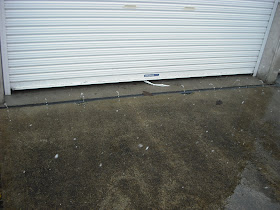Let me explain how the people in Niigata fight with snow. As I said in the preceding post, here in Niigata, the air temperature is relatively high, and melting snow with groundwater is considered the most effective and the least expensive way.
Many people here have a private well on their premises, including me. Mine is 40-meters deep, and here is the submersible pump.
新潟の人たちがどのように雪と戦うかを説明します。先に述べたように、新潟では気温は比較的高いので、地下水で雪を融かすのが最も効果的で最も安価な方法と思われています。
私を含め、多くの人が敷地内に個人の井戸を持っています。私の家の井戸は40メートルの深さで、これが水中ポンプです。
Snow sensor unit (left) and control panel (right)
降雪センサー(左)と制御盤(右)
Yuusetsu you denryoku (electrical power for snow melting) is offered at a lower rate than home electrical power.
融雪用電力は家庭用電力より低料金で提供されています。
The pump supplies groundwater (about 14C) to this pipe, embedded in the concrete in front of the house.
ポンプは、家の前のコンクリートに埋められたパイプに地下水(約14度)を供給します。
The pump also supplies water to two ports, one on each side of the house.
また、家の両側にそれぞれある計2つの給水口にも地下水を供給します。
The left port:
左側の給水口:
Sunnyhose (product name) is connected to the port to sprinkle water to melt the snow.
サニーホース(製品名)を給水口に接続し、水を撒いて雪を融かします。
The right port:
右側の給水口:
The right port also supplies water to the two roofs.
右側の給水口は二つの屋根にも水を送ります。
I had PATEDISON's Shousetsu Sheet installed on the roofs, believing that this product was a dreamy one, one that could change the way the people here in Niigata dealt with snow. I am now totally saddened and depressed to learn that the Sheet does not live up to my expectations. THE COMPANY CLAIMS ON THEIR WEBSITE THAT THE SHOUSETSU SHEET REQUIRES ONLY ONE-FIFTH OF THE AMOUNT OF WATER USUALLY REQUIRED. I could sue the company!
私は、パテジソンの消雪シートを屋根に設置してもらいました。この製品が、新潟の人たちの雪の処理方法を変えれるような夢のような製品だと信じて。今では期待に応えない商品だと分かり、 完全に意気消沈しています。この会社は、HPで通常必要な水量の1/5しか必要としないと言っているんです。訴えたいくらいです。
Even though I have the well, the pump, and all other necessary equipment, I still need those tools to move the snow to where the water is:
井戸、ポンプなど必要な装置があっても、雪を水のあるところに動かすのにこのような道具が必要です。
All the above photos were taken in January, except some.
写真は一部を除いて一月に撮ったものです。
Today's newspaper:
今日の新聞:
which says that the snow accumulation in Yuzawa is 266 cm as of 5:00 p.m. on Feb. 3.
湯沢の積雪量は2月3日午後5時現在266 cmと書かれています。
A view from a window on the first floor of my house:
家の一階の窓からの景色:
Walls of snow:
雪の壁:
















The way of melting snow is interesting. Never seen such before. But it would be impossible to do the same right here right now. Maybe if someone wants to have a ice scating rink next to the house it would be pretty good. Guess electric energy is still cheap in Japan? There are only a few streets here kept ice or snow free with the help of some surface heating system during winter times: roads in front of fire brigade stations and hospitals for example in bigger towns. We do everything to use as little electric energy as possible. Even oil and gas prices are rising too since the beginning of the deep freeze (sharks...), so heating and driving will be more expensive. I am still glad we don't have so much snow even when it looks so nice as in your pictures.
ReplyDeleteKiki: I don't know if the electricity charges are lower than in your country. I only know that Japan is notorious for its high utility charges!
ReplyDeleteAloha Mr.Huroyuki, I cannot believe that you are surrounded by so much snow ! it interesting to know that there are devices to help disolve the snow.
ReplyDeleteWish I could send you some of this awful muggy warm weather to you, I know it would melt the snow !
Btw once the snow melts are there chances of floods ? I hope not.
take care and I hope that you call that roofing company and file a complaint. It sounds as if it was a very expensive installation.
aloha
Oloha, thanks for your concern.
ReplyDeleteSnow will melt only slowly, will never melt in such a way to cause a flood. Every year, snow will remain on the ground until early April here in Niigata, but this much snow in this season may remain until late April or even early May, which is a major concern to rice farmers here.
Hiroyuki, the amounts of snow are impressive, but I'm even more impressed with the snow melting system. You have a beautiful house :-)
ReplyDeleteSissi: The system may be impressive but it's costly! I could have bought a brand new car if I hadn't spent money on the system (well, pump, Sunnyhose, etc.) and PATEDISON's "patented" Shousetsu Sheet!
ReplyDeleteWow, the pictures of heavy snow take me back to my childhood in Japan! Despite the inconvenience, there's something so beautiful and ethereal about heavy snow. I think your method of melting snow is much better than putting salt on the road, which is very common in America. Unfortunately, so much salt is really bad for the plants and also for cars which rust out from the bottom.
ReplyDeleteI would be very annoyed too, if I wasted much money on a failing system.
ReplyDeleteYSC: As I said in the post, melting snow with groundwater is possible because the air temperature here in Niigata is relatively high. In colder areas, yuusetsu zai (snow melting agent?), which contains salt, is used, which causes the problems you mentioned.
ReplyDeleteKiki: For clarification, my system for melting the snow on the ground and the road (the well, pump, pipe, and hoses) is working fine. It's PATEDISON's Shousetsu Sheet that keeps giving me headaches.
ReplyDeleteA car? Wow! This system is really expensive!
ReplyDeleteSissi: I was lucky with the well because I had an individual (the father of a neighbor) dig it. Everything from the well, pump, snow sensor unit, control panel, to the embedded pipe cost me 1,400,000 yen. If I had asked a corporation to do the work, it would have cost more than two million yen.
ReplyDeleteOne year later, I had PATEDISON's Shousetsu Sheet installed on the roofs, and it cost me 1,500,000 yen. The contractor told me that the Shousetsu Sheet alone cost them 700,000 yen. And, I have yet to see the real value of the Shousetsu Sheet.
Now you know how costly (and frustraing) it is to live in a snowry area like mine!